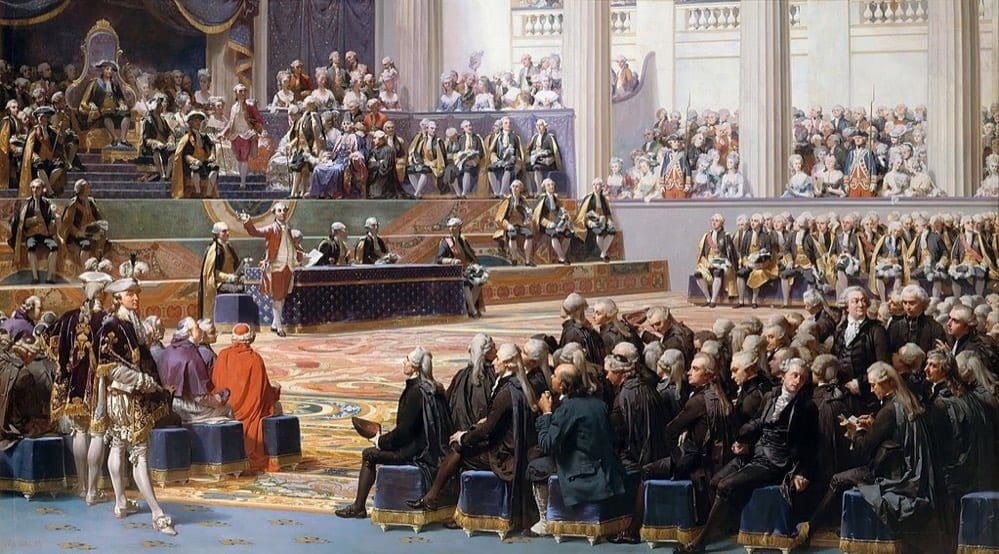

Redefining ‘Left’ and ‘Right’ For the 21st Century
I often hear it said that the words ‘right’ and ‘left’ are no longer fit our politics. So here I shall sketch a redefinition of these terms so they do fit our politics.
The shortest way of stating the argument is this: right is right, and left is wrong. Though I would say that this should only ever be said with polemical intent, and possibly only in the face of someone who insists that left is right, and right is wrong.
A slightly subtler way of stating the argument, and the one which I think is cast iron, since impartial, is this: the left is necessary, but the right is superior.
I
What have right and left meant in the past?
The usual definition of ‘right’ is something negative, inertial or selfish – conservative or reactionary – and is used usually by those who espouse a politics which is positive, progressive or altruistic, that is, on the ‘left’. In different places we may find left associated with equality, leaving right to be associated with its opposite, namely, inequality; or left associated with progress, and right with regress; or left associated with planning, and right with lack of planning; or left associated with openness, and right with closed-mindedness; or left associated with criticism, and right with stupidity. All of these distinctions flatter the left.
The first thing to notice about ‘right’ and ‘left’, however they are defined, is that they form a binary, or an antithesis and so impose a dichotomy on politics. Everyone knows this. And therefore it is common to say that politics cannot be reduced to a simple dichotomy. This has some truth in it. If we refer to the major ideological positions – ‘liberal’, ‘socialist’, ‘conservative’ – then we see immediately that three cannot be easily divided into two. In the nineteenth century the Liberal party was opposed by the Conservative party: but this two-party system left socialism to one side. In the twentieth century the Conservative party was opposed by the more or less socialist Labour party: but this two-party system left the liberals to one side. Almost all our attempts to make sense of politics in terms of labels suffer from the difficulty of explaining how various ideologies, but especially these three, fit along an axis running from ‘left’ to ‘right’.
The second thing to notice about ‘right’ and ‘left’ is that they date from soon after 1789: the great caesura in the history of political thought. Before 1789, the opposite of ‘right’ in politics was ‘wrong’. Everyone understood that the thing to do with one’s political enemy was to execute them or send them into exile. But after 1789, when the opposite of ‘right’ was now ‘left’, the nature of politics changed: instead of executing our enemies or sending them into exile, we admitted them into counsel, arranged them in an assembly, and discussed every matter with them in a civil manner.
The third thing to notice about ‘right’ and ‘left’ is that the valency of right changed. Before 1789, ‘right’ – opposed to wrong – was always superior. But since 1789, and explicitly since, say, the 1930s, if not the 1880s, ‘right’ – now opposed to ‘left’ – has always been considered inferior. Not everyone has used the language of ‘right’ and ‘left’. But John Stuart Mill called the Conservative party the ‘stupid party’ and Tony Blair was only the latest of many to suppose that ‘left’ means honourable, just, open and sensitive, while ‘right’ means atavistic, selfish, closed and brutish. If we add the qualifier ‘far’, and speak of ‘far right’, then we also mean extreme to the extent of violence.
Let me repeat the three or four standard claims about what ‘right’ and ‘left’ have meant until now, though I have to put ‘left’ first, because of its positive charge: left having been taken to be, until now, the proton of modern atomic politics (positively charged, always at the centre of the atom) and right the electron (negatively charged, very hard to locate).
- Left favours equality; right favours inequality.
- Left favours progress; right favours regress or, at best, inertia.
- Left favours planning; right favours lack of planning.
- Left favours openness; right favours closed-mindedness.
- Left favours critique; right favours stupidity.
The different ways of characterising ‘left’ and ‘right’ do not form a coherent set. Good luck trying to harmonise them. The thing is impossible. But I think we can agree that they all, for the most part, make the ‘right’ look bad. (Perhaps only ‘lack of planning’ could be defended, but only in the hands of a Mandeville, a Smith or a Hayek: and, anyhow, ‘lack of planning’ has been out of fashion for half a century and whatever vestiges of it remained in 2020 were destroyed by COVID-19.)
II
I certainly do not think the established ways of characterising ‘left’ and ‘right’ can be harmonised. But there is something to be done, which is to offer a redefinition of the meanings of ‘left’ and ‘right’.
The way to do this is to say that a ‘left’ politics is a synecdochal politics, while a ‘right’ politics is an unsynecdochal politics. That may sound pretentious, but it is fairly simple in meaning. ‘Synecdoche’ is a rhetorical word, which refers to the phenomenon whereby we let a part stand for a whole. It is common in poetry and in casual speech. To take young men, for instance, describing them as ‘coxcombs’, ‘blades’ or ‘redcoats’ are examples of synecdoche, letting a part stand for the whole.
So from now on the word ‘left’ should stand for a synecdochal politics, in which a part stands for the whole. This could be any politics, especially a ‘conviction politics’, where the conviction is that ‘something should be done’ – achieve ‘Net Zero’, or ‘Zero Covid’, to take only two local examples. It is a politics in which everything is to be justified in relation to a very particular conception of the good. In older times this was usually socialist, though in the last 30 years it has become generalized – via the phrase ‘social justice’ – to other things like matters of race and sex, and has also been interestingly mixed up with apparently scientific imperatives such as the need to minimise the spread of a virus or minimise our ‘carbon emissions’.
In the same way, from now on, the word ‘right’ should stand for an unsynecdochal politics: that is, a politics which possesses a sense of balance, justice, order, proportion, appropriateness. This is a politics which takes society as a whole, not only in the present, but understood in relation both to past and future – where the ‘future’ is not the narrow synecdochal future of some left imaginary, but a genuinely open and generous and cautious sense of the future. This is why a ‘right’ politics, in my sense, is not necessarily ‘liberal’ – it might not be economically or culturally liberal. It might in some respects and on some occasions be more ‘socialist’ than ‘liberal’: though not if socialism is a policy rather than a sensibility. But it is usually, in some sense, ‘conservative’: not in any narrow economic sense, of course, but, again, in terms of a sensibility rather than a policy. As soon as I say ‘sensibility rather than policy’, of course, I should return and say that ‘right’ politics is also liberal: but more as a sensibility than as a policy.
This may sound vague. But that is the point, in part. A ‘left’ politics is sharp, over-focused, obsessive, and usually wrong. It is, alas, most of the politics of our time. A ‘right’ politics is vague, comprehensive, cautious and usually right.
It should be obvious why my redefinition of ‘right’ and ‘left’ is also a revaluation.
III
You may well ask if there is any basis for this redefinition of ‘right’ and ‘left’. Anyone may redefine terms. Usually one is doing no more than building another buttress for the Tower of Babel, or throwing another ingredient into the stew of confusing contemporary language – and offering novelties so arbitrary they are likely to be forgotten. But I do not intend this distinction to be forgotten, and I say this because it does have a foundation in reality. It has a foundation which goes deeper than politics. It is found buried inside our skulls.
By a happy accident, the right hemisphere of our brains possesses many of the characteristics of what I am calling an unsynecdochal or ‘right’ politics, while the left hemisphere of our brains possesses many of the characteristics of what I am calling synecdochal or ‘left’ politics. It is one of the major achievements of the psychiatrist-philosopher Iain McGilchrist to have demonstrated this, in his books The Master and His Emissary (2009) and The Matter With Things (2021), though, with great discretion, he barely mentions politics at all in those books: leaving it open for me to frankly steal his observations, and his distinction, and apply them to politics.
McGilchrist’s books are extremely long, and contain much that is fascinating. But I shall content myself with a brief summary of the major lines of distinction between left hemisphere and right hemisphere, or, as I shall call them for short, ‘left’ and ‘right’. McGilchrist’s vast compilation of psychological evidence indicates that the left is self-regarding, the right is other-regarding. The left is utilitarian, the right not. The left is best at focused attention, the right at every other sort of attention, including attention to context, relevance, importance and tone. The left thinks in a linear manner, the right in terms of patterns. The left finds it much easier to suppress the right than the right finds it to suppress the left. In truth, the left does not understand the right. The left needs certainty. The left does not like taking responsibility. The left likes to blame others. The left cannot bear to be in the wrong. The left likes horizontal orientation – think of equality – whereas the right like vertical orientation – think of hierarchies. The left is passive, conformist, and follows received opinion, while the right is more independent, has a ‘bullshit detector’ (McGilchrist’s words) and can play devil’s advocate. The left does not work with the world as present to us in all its variety, but represents “the world in a form that is less truthful, but apparently clearer, and therefore cast in a form which is more useful for manipulation of the world and one another” (McGilchrist). The left grasps, whereas the right reaches out. The left favours either/or decisions, whereas the right favours both/and conclusions: meaning that the right can deal with ambiguities. The left is more easily hypnotised. The left knows less than the right, but is convinced it knows it better. The left assess reality in terms of theory, the right in terms of experience. And, finally, in a nice summary: “The left knows, but doesn’t believe, while the right believes, but does not know.”
In short, our brains are the physical embodiment of a dichotomised intelligence. We exist within a continual binary or antithetical consciousness. And this antithesis runs much deeper than any of the old or obvious political ways of characterising ‘left’ and ‘right’: all that standard rigmarole of equality and inequality, planning and lack of planning, and so on: all of which is superficial. At root we have a difference between, on the one hand, the sharp focus running into over-focus and the self-serving nature of the left, and, on the other hand, the calmer, more meditative, indeed, wiser nature of the right. It should be obvious that everything McGilchrist tells us about the right hemisphere is something which is a virtue in politics.
This is not to say that we cannot do without ‘left’ in politics, any more than we can do without the left hemisphere in the brain. But, if the left is necessary, the right is superior. In politics the left alone is a politics of self-imposed disaster. In so far as our politics has become heavily leftist in the last few centuries, and especially and explicitly in the last few decades, and perhaps catastrophically in the last few years, our politics is a mad politics of over-focus, self-service, corruption, modelling, misinformation, disinformation, policy imperatives, expedients, bright ideas, virtue-signalling rhetoric – including all the most recent and spectacular contributions from the various ‘lefts’: the Black Lives Matter left, the Extinction Rebellion left, the Zero Carbon left, the Lockdown left, the Vaccine Mandate left, the Trans Rights left, and so on.
What we need is a return to a balanced politics, which would be a politics where the left was recognised as necessary, but the right as superior: where it was understood that balance, proportion, generosity, justice, caution, tradition, scepticism all are far more secure grounds for activity than the frenetic and usually corrupt imperatives of the grotesquely hypocritical and hyper-rationalised politics of the left.
The left should not be trusted. It is not trustworthy. Our rulers over the last three years were all leftists, allowed to lead the country in the wrong direction, since even those supposedly on the right were prone to think that a left response was the only response to the pandemic.
IV
To summarise, from now on:
- We should define left politics as synecdochal politics, and right politics as unsynecdochal politics, so the left stands for partial, limited, over-focused, potentially misleading and self-serving policies and principles, and the right stands for policies and principles which seek proportion and appropriateness; and
- Since the left is, even when in pursuit of an admirable ideal, always letting a part stand for the whole, while the right is continually conscious of a responsibility to the whole.
It follows that we have to recognise as a fundamental law of politics THE NECESSITY OF THE LEFT, BUT THE SUPERIORITY OF THE RIGHT.
Dr. James Alexander is a Professor in the Department of Political Science at Bilkent University in Turkey.







